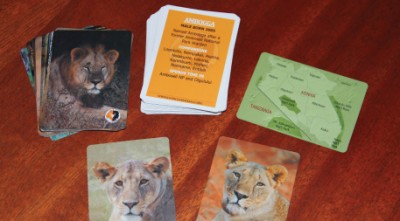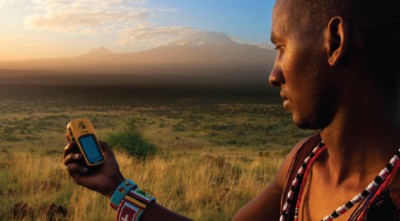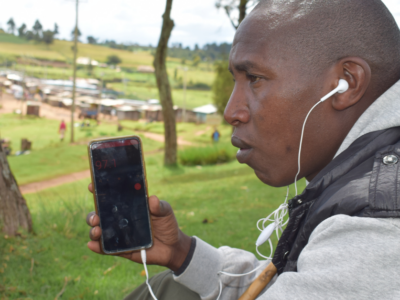
Male Lion at Sunrise, Ol Pejeta Conservancy, Kenya, East Africa. Photo by Diana Robinson. CC-BY-NC-SA 2.0
This post by Stephanie Dloniak was originally published on Ensia.com, a magazine that highlights international environmental solutions in action, and is republished here according to a content-sharing agreement.
On a scrubby plateau just beyond the shadow of Mt. Kilimanjaro, in a canvas tent under a metal roof resembling an airplane hangar, Philip Briggs deals three lions from a deck of cards.
“These females all had cubs in early 2010, right after the drought broke,” he says. “They started hitting bomas [livestock enclosures] constantly, and Narika was speared by a hunting party in retaliation.”
The cards were created by the Kenya-based nonprofit organization Lion Guardians to help local conservationists get to know individual lions. Each has a photo and description of a lion living in the vicinity of Amboseli National Park in Kenya. Arranging the cards into family trees and sliding them across the wooden dining table just as though they were big cats moving through the landscape, Briggs and Stephanie Dolrenry, biologists with the Lion Guardians, tell the story of chronic livestock-killing lions and how Narika’s death helped inspire a tool for managing such problem lions — mock traditional hunts.

Trading-card-like images and descriptions of lions help Lion Guardians distinguish among individual animals as they work to minimize human-lion conflict. Photo by Stephanie Dloniak
The Maasai, the indigenous pastoralists of southern Kenya and northern Tanzania, have always hunted lions — in response to attacks on livestock and as a celebrated rite of passage into manhood. During a hunt, a party of warriors tracks a lion on foot, closes in with traditional chanting and screaming, and finally attacks and spears it in a noisy frenzy.
“After Narika was killed, her sisters, their cubs, and a male named Lomunyak all left the area and stopped killing livestock for two months,” Dolrenry explains. “We saw this huge behavior change.”
“If they are reprimanded after attacking livestock, they can learn.” — Eric Ole Kesoi
The Lion Guardians team wondered whether mock hunts — which closely mimic real hunts, except the animal isn’t speared in the end — could achieve the same result in behavior while helping protect the big cats. Lions now occupy just 25 percent of their historical African range and their populations are declining, largely due to loss of habitat and prey and retaliatory killing.
“[The Maasai] believe lions are bright animals, so they know when they have done something wrong,” says Lion Guardians community manager and Maasai elder Eric Ole Kesoi, who has participated in several of the mock hunts. “If they are reprimanded after attacking livestock, they can learn.”
The Lion Guardians aim to conserve lions by melding traditional ecological knowledge and values of the local Maasai people with modern technology and data analyses. The Maasai warriors who are chosen to become guardians are trained and then armed with radio-tracking equipment, GPS units, decks of lion cards and mobile phones in addition to their traditional clubs and knives. The young men track lions, record problems with wildlife, warn herders when lions are present and find lost livestock. The Lion Guardians appear successful so far; the local lion population has more than doubled in the past four years and very few lions have been killed. The mock hunts add one more important tool to their toolbox.
So far the Lion Guardians have conducted six mock hunts against individually identified lions that were known to have repeatedly attacked livestock in bomas and could be tracked immediately afterwards. The preliminary results are promising: All mock-hunted lions stopped killing livestock for one to two months.

Lion Guardian Ng’ida takes a GPS point in front of Mt. Kilimanjaro. GPS data help Lion Guardians track animals and keep livestock out of harm’s way. Photo by Philip Briggs.
Ole Kesoi sees value for both lions and the Maasai. Using mock hunts as a kind of aversion therapy could lead to less conflict and fewer dead lions. At the same time, the hunts allow the Lion Guardians to take active roles in protecting their community.
Not everyone is sold on the idea, however. Craig Packer, an ecologist at the University of Minnesota, has studied lions in neighboring Tanzania’s Serengeti ecosystem since 1978. “Although the Lion Guardians have certainly been valuable and innovative, I worry about the long-term sustainability of the program,” Packer says. “The challenges of long-term lion conservation are going to require a lot more than ‘culturally appropriate’ conflict-mitigation strategies.”
Susan Alberts seems more hopeful. A biologist at Duke University, Alberts has worked in the ecosystem for more than 20 years with the Amboseli Baboon Research Project.
“The main threat to wildlife in Amboseli is human population growth. We all know what’s required to deal with that — education, some voluntary resettlement, probably compensation. There’s no magic bullet. Having said that, the application of knowledge about the predators as well as making the community feel that they have a stake in the ecosystem remaining intact seem completely essential to going forward.”
Using mock hunts to change the behavior of problem lions is certainly not a magical solution for conservation in Africa. But along with other approaches — in particular, those that draw on local traditions and values — they may help both wildlife and the people who live with wildlife win life’s games with the cards they have been dealt.
Editor’s note: Stephanie Dloniak produced this article as a participant in the Ensia Mentor Program. Her mentor for the project was award-winning environmental and science journalist Michelle Nijhuis.






2 comments
http://www.ted.com/talks/richard_turere_a_peace_treaty_with_the_lions?language=en
Many of you here care about the wildlife and here is your chance to help out “The Love Lions Alive Project” It’s a sanctuary protecting 50 Lions and cubs.
Maybe you seen the show “The Lion Queen” on Animal Planet or Vimeo.com and you know from the show the lions and Andi Rive are constantly fending off poachers, creditors, lawyers and hunters
Every Donation goes right to Andi and the Glen Garriff Farm in South Africa and it helps Andi and her staff to pay for veterinary bills, food, expansion of enclosure sizes, enrichment activities for the lions… and it allows them to offer sanctuary to other lions in need of refuge.
A $1 donation is all I ask… If you can donate more that would be an incredible.
Use this link to donate right now. Thank you
http://www.indiegogo.com/projects/love-lions-alive-project/a1c1/10189945